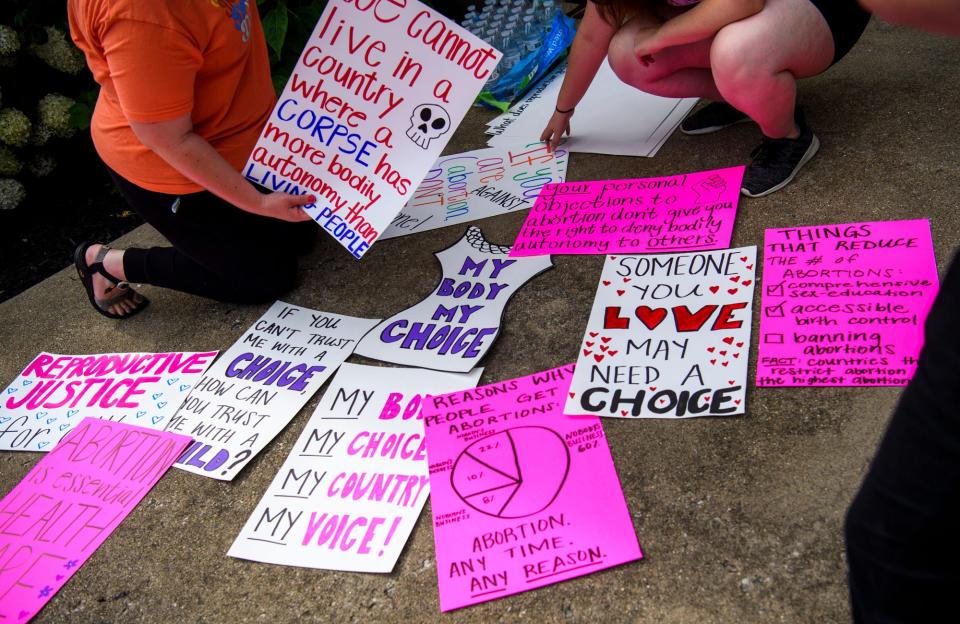Many struggle to find a doctor to tie their tubes. Roe's overturn may make it harder
Editor's Note: This story has been updated to clarify Jennifer Drobac's title and that the 1973 Roe vs. Wade decision was based on multiple Constitutional amendments.
Katie Rose Stempf lives in a small, religious Indiana town where people are "very antiquated with their beliefs." It's the place where her mother was denied birth control years prior because she was considered too young, despite already having kids.
When Stempf first wanted to get her "tubes tied," a colloquial term for tubal ligation, the Catholic hospital she went to talked her into an IUD instead. Within four years, she developed precancerous lesions from the implanted contraceptive.
"That made me want to just be done with birth control," she said.
The scare reignited her desire to end her chances of an unplanned pregnancy for good.
She already had two kids. She was going back to college. She was married once before but is now a single mom. She was 36. She couldn't afford another child. Other forms of birth control messed with her hormones. Still, she had to be stubborn and persistent to receive the procedure.
Stempf eventually was given a referral to a Bloomington specialist to treat the lesions and ultimately tie her fallopian tubes. Four years ago, she made the 50-minute drive from Loogootee — the same trek others make to receive reproductive healthcare.
Others are reading: Threats, vandalism and the First Amendment: Indiana town divided by LGBTQ Pride display
Amid the expected loss of abortion rights for many people in the U.S., and possibly access to contraceptives, the conversation regarding the barriers to a procedure permanently curbing the risk of pregnancy has intensified. Some doctors have turned away people with uteruses, saying they are too young, need their husband's consent or may change their mind later.

What is tubal ligation?
When a person says they want to get their "tubes tied," they want to receive a tubal ligation, which is a form of sterilization. Many receive this procedure after childbirth, but it can be done at anytime.
During this procedure, the fallopian tubes, which are the avenues that the egg travels from the ovaries to the uterus, are cut, tied or blocked. This permanently prevents natural pregnancy, but IVF can still be possible. While the procedure is generally very safe, there are some rare risks, including infection or ectopic pregnancy. Reversals have been performed before, but it is not always available, possible or successful.
Since the procedure is permanent, a few safeguards have been put in place by local governments and doctor's offices. In Indiana, a person needs to be 21 or older, give consent and be mentally competent to be sterilized. Some places require a waiting period. Consent forms are also common.
Hit or miss healthcare
Some doctors don't trust women to understand the permanence of this procedure or anticipate the effect on later reproductive decisions, said Jennifer Drobac, an Indiana University Robert H. McKinney School of Law professor. When doctors consider the impact of a woman's decision on husbands or male partners, Drobac said it assumes that woman does not have full autonomy of her body.
"This type of thinking that you can't legally function without your husband is a notion that was active in 1868," Drobac said, "the period in time that the Dobbs majority would like to take us back to."
A 2010 study found providers were significantly more likely to dissuade a person with a uterus from tubal ligation if that person was young, had fewer children or was not on the same page as her husband. If a patient is persistent, the study said most doctors eventually helped them receive the procedure.
Denying a person something that isn't necessarily a right but other people can access opens the door to discrimination. In the case of tubal ligation, Drobac said denying a younger, unmarried woman could be seen as age and marital discrimination.
The American Medical Association code of ethics says physicians are "free to choose whom to serve" but also have "an ethical responsibility to place patients’ welfare above the physician’s own self-interest." During the Trump presidency, the AMA said it would protect those who refuse to perform certain services that violate their religious views.
Regardless, Drobac said she would not return to a doctor who would question her medical decisions based on her gender or for religious reasons. That action would show the doctor does not view the patient as a person capable of making decisions about their body, she said.

Legal considerations
People who regret the decision, later on, may blame the doctor, she said, but legal risks can be mitigated through a consent form with clear language that it is non-reversible.
Doctors are risk-averse to lawsuits, which will only be emphasized by the recent Supreme Court ruling, said Lucía Guerra-Reyes, an Indiana University School of Public Health professor.
"All of this sort of is a patriarchal notion that men, men in power, in this case, know best about what women's needs are," Guerra-Reyes said.
Medical professionals already have significant power, she said, and the overturning of Roe v. Wade only gives doctors more agency to decide what rights a person can access. It gives them an opportunity to impose their own morals onto their patients, she said.
"There's no other thing that I know of that has this much pushback, that impedes on men's bodies," she said.
There are a few other surgeries similar to tubal ligation. One is a hysterectomy or the removal of the uterus, which is often sought by those with endometriosis. Another is a vasectomy, which is when the tubes in the scrotum are cut or blocked. The procedure is less expensive, more accessible and a largely accepted practice.
Deteriorating access
Just as limiting abortion access disproportionately affects disadvantaged communities, so does the availability of tubal ligation.

Low-income minority women were less likely to be sterilized due to doctoral dissuasion, a study published in 2014 reported. Also, low-income and minority groups have lower rates of health literacy, and a tubal ligation typically requires a consent form.
Restricting access most affects the people who don't have the knowledge, resources or money to navigate a restricted system, Guerra-Reyes said. In rural areas, people may only go where their insurance is accepted or to the only hospital in their town.
"Not everybody can go elsewhere. Not everybody knows there's an elsewhere. Not everybody has the money to go elsewhere," Guerra-Reyes said. "They don't have any way of circumventing this."
Legal questions: Monroe County prosecutor will use discretion in abortion cases when state law passes
Some can drive 12 minutes across Bloomington to Planned Parenthood, but that's the amount of time it takes Stempf to get to her nearest gas station. A roundtrip to Bloomington takes her just under 2 hours.
About one in seven patients in the U.S. receives care from a religiously-affiliated institution. These hospitals may have restrictive policies, like what Stempf experienced in Jasper, and can lead to increased repeat pregnancy rates.
"Bloomington has been the friend of women in this area, I believe, for the last 20 years," she said.
Bloomington is a haven for women in surrounding counties to receive reproductive healthcare, Stempf said. In addition to her experience, she has helped women in similar situations in her community find religiously controversial care. She is worried what will happen when these resources are further constricted.
Many across the county are flocking to social media to find gynecologists said to perform tubal ligations. A spreadsheet passed around online lists doctors who may possibly perform the procedure without age or martial bias. This list is not exhaustive, but about 30 Indiana doctors are included — none in Bloomington. The closest providers listed are an hour away in and around Indianapolis.
There are providers in Bloomington who do perform tubal ligation, including IU Health. Spokesperson Samantha Kirby did not comment specifically on IU Health's protocol for the procedure and said the hospital system cannot speculate on possible state Legislature actions.
Stempf said she likely would not have gotten the procedure done if her insurance wasn't as good as it was.
Issues arise for people regarding how much of the procedure is covered and whether it is private insurance or Medicaid that pays. About a decade ago, fewer than 25% of publicly funded clinics offered tubal sterilization, which affects low-income people reliant on those services.
Where is the line?
There is currently no legal prohibition on tubal ligation, but Drobac said some states' legislation is edging toward it. If the law defines any interference of a mature egg as illegal, tubal ligation could be outlawed.
Drobac said the overturning of Roe v. Wade on June 24 is like a Jenga tower of other rights tumbling over. Roe was based on multiple amendments to the Constitution, including the Ninth Amendment, which expresses that not all rights held are listed in the Constitution. Multiple other rights are determined on the same basis, including much of family law, including the right to marry. However, she said the U.S. Supreme Court ignored this clause and instead focused on what was not included in the 14th Amendment to invalid the 1973 ruling.
"When you pull out abortion, you risk the integrity of the interpretation of liberty," she said. "I think it raises just a ton of questions."
An unclear future: What’s next? The implications of a post-Roe v. Wade world remain murky
Guerra-Reyes said she is concerned contraceptive access will be more strictly regulated. She recalls it was not too long ago that a medical reason was necessary to receive birth control.
"All of the things that allow us to actually decide if we want to have children and when we want to have children are in danger," she said. "In essence, it negates our humanity."
When she was going through the process, Stempf felt her providers thought she wasn't educated enough to make her own decision, that she hadn't done her research.
She felt a weight off her shoulders when she finally received her tubal ligation. She no longer had to worry about her IUD putting her at risk, birth control messing with her hormones or finding out she's pregnant.
"It could have been a long time ago."
Cate Charron is an intern at The Herald-Times. You can reach her over email at ccharron@heraldt.com or on Twitter at @CateCharron.
This article originally appeared on The Herald-Times: Roe's overturn may make it harder for those who want to get tubes tied

